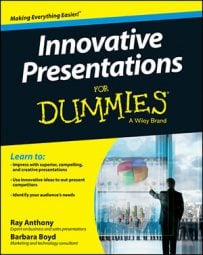You created a list of all expected possible questions based upon your innovative presentation. Still you're likely to get a legitimate question or two that you never considered and that leaves you wondering, "Where did that question come from — out of left field. How did I miss that one?"
Unless you're psychic, you can't anticipate everything, and unless you're omniscient, you can't know everything, although some in your audience may think they do.
When you're asked a question you don't have an answer to, follow these guidelines:
Be confidently candid: If you don't have an answer to a question, just admit it in a matter-of-fact way without feigning embarrassment, disappointment, or any other negative reaction however slight. With a steady, sure tone of voice, say, "I don't know" or "I'm not completely sure, so I'd rather get you the exact and accurate answer by (give date)."
Then, in a very obvious way, write down the question and person's contact information (or select someone else to do it), research it, and follow up on time as promised. Be specific, if possible, "I will contact our head of engineering today, and if his schedule permits giving me an answer quickly, I will get back to you no later than tomorrow afternoon. Is that okay?"
Defer to the audience or an expert: Depending upon your topic and audience, you can redirect the question to the group if you know someone in it is capable of delivering the answer, "I know there are likely some folks here who are experienced in this area. Any thoughts on answering that (question)?" Oftentimes, people are quite eager to be engaged to speak and show their knowledge.
You may know of a masterful speaker who deflects questions with humor in a rather effective way without being flippant.
If she gets questions like, "Where do you think that technology will be in ten years," she replies, "I wish I were the Oracle of Delphi to answer that, but this technology is advancing quickly and its development is unpredictable, I might as well look into a crystal ball for an answer. However I'll give you my thoughts on where this technology will likely go in the next three years…"
If a question is outside of your field of expertise or experience, you can ask if a team or audience member with relevant credentials can answer it.
For example, if you're an engineer and someone asks a financial question, you can direct the question to someone you know is a finance or accounting person. You can say something like, "Tanisha, you're an MBA. Do you have any insights about the rough payback and return on investment estimates?" Or, "Are there any financial people in the audience who might want to guesstimate those approximate numbers?"
Another tactic to use selectively if someone comes up with a real surprise question is to say something like, "That's a rather interesting slant on it that I haven't thought of. Before I give you my thoughts on it, does anyone in the audience want to give us your opinions on it?"
This will give you time to think of an answer — that you may not need if other people eagerly jump in to reply to the questioner.

